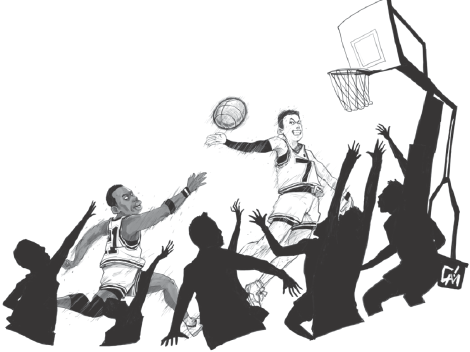 |
|
Cai Meng/China Daily |
The curtain has come down on the 2015-16 season of the Chinese Basketball Association. But the drama it generated through its finals series still lingers. Entering the best-of-seven series as the underdogs, Chengdu-based Sichuan Blue Whales club (also known as Sichuan Jinqiang) sprung the greatest surprise by defeating traditional powerhouse Liaoning Feibao 4-1 last week to claim the franchise's first league championship since being promoted to CBA in 2013.
But the celebrations of Sichuan Blue Whales have been somewhat mooted because of criticisms for its reliance on three foreign stalwarts-Iranian center Hamed Haddadi and the American duo of Mike Harris and Justin Dentmon, who proved too strong to handle for Liaoning's two foreign players.
Allowing five teams, including Sichuan Blue Whales, with the worst records from the previous season to sign a third player from an Asian country in addition to the quota of two foreigners which the other 19 clubs (except for the no-foreigner army team Bayi Rockets) have to be satisfied with has been the CBA rule since 2008, in order to strike the right balance in the competition.
But it is unfair to criticize the new champions for making the best out of the rule, or to overlook the contribution of its prolific local players such as veteran Zhang Chunjun and young guard Wang Ruheng.
It is time, however, for the league to reflect on its foreign player policy, because the quick ascent propelled by high-profile imports won't necessarily translate into long-term success. This is important because the shocking decline of three clubs-Qingdao Eagles, Jilin Northeast Tigers and Shanxi Brave Dragons-to the bottom this season after making the playoffs last year with the help of a third foreigner paints a sorry picture.
During the 2015-16 CBA season, 52 hoopsters from around the world, mostly ex-NBA players, plied their trade in China but few of them succeeded in lifting low-lying teams to prominence. Sichuan Blue Whales' foreign trio changed that.
But a line has to be drawn between gambling on the one extra foreign player, who chooses China as a career stopover, and making good use of those who are committed to benefiting the CBA league.
Beijing Ducks' former NBA All Star guard Stephon Marbury, who helped the capital's team win three league titles from 2012 to 2015, is one such example. Mar-bury, a former New York Knicks player, reinvented himself in China by developing a chemistry with his Chinese teammates and blending in with Chinese culture off court as well after a less-than-inspiring end to his NBA career.
Scenes of Marbury commuting on the Beijing subway, cheering for the capital's soccer club Beijing Guo'an at the iconic Worker's Stadium and visiting children in hospital have helped him shed the labels of an arrogant foreigner.
The arrival of high-profile ex-NBA stars such as Tracy McGrady and Gilbert Arenas, who joined Qingdao Eagles and Shanghai Sharks for the 2012-13 season, also helped push up TV ratings for and increase sponsors' interest in the CBA league.
Of course, there have been disappointments. Former NBA All Star forward Kenyon Martin spent most of his time on the bench after signing for Xinjiang Flying Tigers during the 2011 NBA lockout because of his poor chemistry with his Chinese teammates.
Like it or not, a team expecting to succeed in the long run in the CBA league has to stand on its own by cultivating homegrown talents rather than by luring big-names from abroad with lucrative paychecks.
The author is a writer with China Daily. [email protected]

I’ve lived in China for quite a considerable time including my graduate school years, travelled and worked in a few cities and still choose my destination taking into consideration the density of smog or PM2.5 particulate matter in the region.